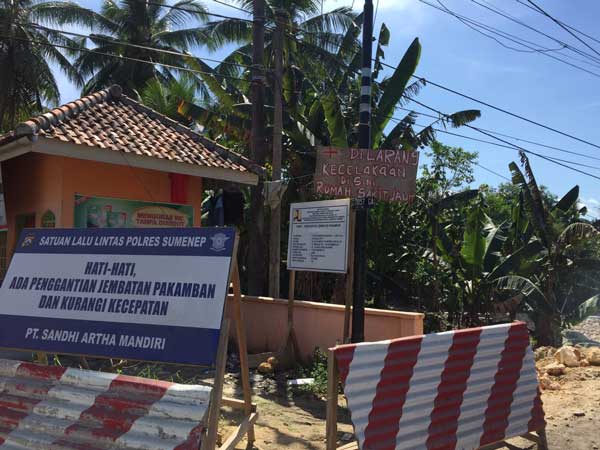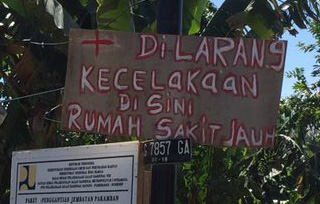
What is it with Indonesians and the law? It seems to me the country is beset with enthusiasm for purely symbolic laws, coupled with an utter disdain for the actual law. The photo above, taken in the Maduran town of Sumenep by my friend and colleague Michael Buehler, provides a delightful, home-made example of the first. Here’s a closer look:

“Forbidden to have a traffic accident here!” it declares, above a gaping hole in the road. And then it gives its reason: “The hospital is far away”.
The example is rather charming, and it’s not, after all, a law. But it puts me in mind of that tendency that officials have (especially but not exclusively in Indonesia) to think that the answer to every problem is to issue a diktat. When I was working on HIV at the beginning of the decentralised era more than a decade ago, several districts thought they could legislate their way out of the epidemic. The moralisers forbade sex work (though selling sex was not illegal in Indonesia); the “pragmatists” issued regulations obliging clients to use condoms. Though the reason — to slow the spread of an unpleasant virus — was at least as good as “the hospital is far away” — the regulations were as impracticable as enforcing a prohibition on traffic accidents, and they had predictably little effect. Their main purpose seemed to be to show that the government was “doing something” about the issue. And that excused politicians from doing anything that might actually work — look, we’ve banned sex work, job done!
The most distressing recent example of the disdain approach comes from President Joko Widodo himself. Constitutionally, everyone in Indonesia (even foreigners, even suspected drug dealers, even — sharp intake of breath — foreign suspected drug dealers) has a right to due process of the law. But Jokowi seems keen to wave those rights away. “I’ve already said: just be tough. Especially with foreign drug dealers who come and do even a little wrong. Enough already! Just shoot them on the spot. Don’t show any mercy.” It’s possible that the president was playing to the peanut gallery — he was speaking at the meeting of a conservative Moslem political party — but still, the head of state probably shouldn’t go around urging people to engage in extra-judicial killings, especially of foreigners.
The national narcotics board says between one and five million Indonesians currently use drugs, Indeed by their reckoning, one in every five adults in the capital Jakarta could be a drug abuser, though their are many reasons to take official figures with a pinch of salt. Whatever the true number is, it’s certainly a LOT. And to hear the country’s leaders speak right now, you’d think that every one of them was the puppet of a wicked foreigner. In a recent press conference called to show off a seizure of meta-amphetamines apparently imported from China by a Taiwanese citizen, the head of Jakarta’s drug office said one alleged trafficker had been shot dead. He issued this very stern warning(video) to foreign drug dealers:
“Jangan coba2 lagi masuk Indonesia untuk meracuni orang Indonesia dengan narkotika. Kami akan tindak tegas semua bandar luar negri yang mau masukan di Indonesia ini bahan narkotika untuk merusak warga negara Indonesia, merusak rakyat kita. Kita akan perang dengan narkoba ini, dan melakukan tindakan tegas seandenya ada warga negara asing yang akan memasukan narkoba kepada Indonesia”
If you’re a foreign dealer who wants to hear that stern warning but who’s Indonesian isn’t quite up to it, well, there’s always Google Translate.* Oddly, the police chief didn’t mention the many recent cases in which Indonesian police officers have been caught taking drugs, nor the irrational investigation and sentencing practices which overfill prisons with small-time dopeheads and foreign mules, while rarely netting the domestic kingpins. Perhaps the police should put up a sign at ports: “Forbidden to import drugs! The jails are full.”
*But for convenience of Indonesia Etc readers, here’s my version:
“Don’t try ever again to come in to Indonesia to poison our people with drugs. We will come down hard on all foreign dealers who want to bring drugs into Indonesia so that they can wreck the nation, wreck our people. We’ll fight against these drugs. and we’ll come down hard if there’s any foreigner who [plans] to bring drugs into Indonesia.”





Thanks ,I don’t follow everyday news , but I like indonesia
, your book helped me understand more too,
When I worked in East Kalimantan, the government used to blame the prostitution on the expats/foreigners. At the time there were about 20 of us in that area. In an article in the local paper, government officials (who did actually shut down one of the main Dolly type areas) claimed there were 300 prostitutes (which probably meant there were quite a few more). We used to joke about how difficult it was to keep up with 15 prostitutes each. But as you say in the article, the solution was to pass a law and close down the known areas, driving it underground, with less chance of health checks, condom use and education. But they obviously gave themselves a pat on the back for doing “something”.
The elephant in Indonesia’s narcotics living room is that, like the elite of the west, the nation’s top elite are doing drug business. Enter the biggest disco in any large Indonesia city and see how long it takes to find drugs. Who benefits from Afghanistan’s 7,500 tpy opium exports? The “War On Drugs” is a cynical sham.
It’s their country. Why is it always the job of foreigners to criticize and dengegrate what they don’t like about a foreign country. Whether it be the laws, the drugs, the people or the tradition. Is it because their laws and ways of doing things are not like your western ways?